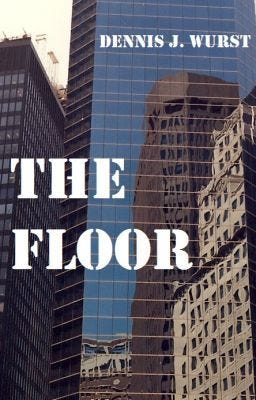I drop dry Cheerios. The ambush takes place, roughly 200 feet away.
From the safe vantage point of Nick’s corner office on the 4th floor, I witness a violent diamond heist on Park Avenue and 46th Street.
Gun shots, screeching tires, spilled blood and cereal!
A black BMW cuts off a white Range Rover, inside the northbound Helmsley Building tunnel.
Most witnesses are stuck in offices or surrounding vehicles. I watch from a safe distance.
Thieves in dark suits and red bandanas riddle a Diamond District delivery with bullets. The halted Park Avenue-bound traffic beeps in ignorance.
Briefcases, cash and jewels were just taken. Victims stagger out of the SUV. The general public has no idea. I have another front row seat.
“For once, a robbery actually takes place on the other side of the glass!”
I chuckle alone in Nick’s dark office. “That was really good! I have to use that someday.”
Meanwhile, my witty quip is wasted on an empty room. I walk home, after holding up my boss for a raise or a promotion.
Tupperware Lady
Nick forced us to stay late. Our involuntary detention is held in the same 7th floor conference room that we use for our morning meetings.
Some grab soggy sandwiches. I take Cheerios.
Stale pastry and cereal dispensers line the credenza. A lady with mall-rat hair and an unmistakable north Jersey accent attempts to rally our troops.
Nick’s underqualified sales motivation friend is not ready for us. Few are. It’s a rough bunch.
Her one-episode appearance interrupts our Fixed Income family feud, like an unwelcome interloper on The Beverly Hillbillies.
Her gung-ho delivery and nauseating enthusiasm probably work wonders with Morristown luxury car dealerships. Not here.
Perched on a career gang plank and fighting for our jobs, we are not her target audience. She’s not ready for this.
She teaches us to determine our customer’s needs, by badgering them with questions that begin with, “In your opinion, do you feel …?”
In a car dealership environment, that question definitely makes sense. However, it’s simply not a sentence structure that anyone in this department would conceivably use, regarding bonds. It’s just not.
Money managers pay brokerage firms to find secondary-market (or used) bonds that fit their risk and price parameters.
There are no feelings involved, just returns and maturity.
Corporate bond yields are compared to theoretically risk-free US government paper. In 1991, our 10 year Treasury bond yields 7.86% each year.
Typical AAA rated high-grade investors get an extra 91 basis points for lending the money to a strong company, instead of the government’s US Treasury Department.
10 year ‘Baa’ (or “B Double-A”) rated paper pays investors 9.80%. That’s an extra 194 basis points or 1.94% in annual yield, for lending to a moderately strong investment grade borrower.
Junk bonds trade at much wider spreads than that.
Buyside clients talk to sales people, who sit across from traders. Before giving a sellside trading desk a firm order to buy or sell bonds, the initial customer inquiry for high grade bonds might sound something like this:
“My fund wants to buy $5 million 10-year corporate bonds with a Baa (B Double A) rating to yield at least 0.75% (or 75 basis points) better than US Treasury bonds with the same maturity. Consumer, chemical or industrial borrowers please, no banks or insurance companies. Thanks.”
Sales people share customer inquiry with the trader, who directs bond order traffic. Traders check the axe sheet then ask the rest of the desk, a few competitors and maybe some external street broker wholesalers for appropriate bonds to show to that customer.
If we sell customers bonds out of Bear Stearns inventory, we call that a principal trade. Whenever we match buyers with sellers as mere brokers, that’s called agency trading.
Bond sales people help portfolio analysts to navigate risk, yield and price decisions, not whether the customer wants cloth or leather seats.
Regardless, our torture continues.
“In your opinion, do you feel…?” supposedly opens the floodgates like a customer feedback fire hydrant. It won’t.
Her mantra is intended to break the ice and to facilitate discussion. It won’t.
Goldman Sachs banking program forces coworkers to catch each other’s drunken stage dives at Le Bar Bat on 57th Street.
As annoying as all that team-building bullshit sounds, at least they get cocktails and fancy appetizers.
We’re stuck with Nick’s big-hair Tupperware Lady and a bowl of dry Cheerios.
The Hold-Up
She asks for a volunteer. The entire desk stares at me in unison, silently handing the talking stick over to someone with a somewhat faulty mute button.
I read the room then lob with a harmless tone, “In your opinion, do you feel that I should send the axe sheet over the white or the tan fax machine?”
Everybody laughs but me. I ask in earnest, maintaining a poker face for the charade.
“Don’t laugh at your young coworker!” she insists kindly. She smiles with encouragement then gets our company’s name wrong. “I bet he carries some other responsibilities here at Bear and Stearns. Try again, hon.”
The Tupperware Lady just delivered the perfect set-up. I’ve been waiting for this moment for months. I pivot to face Nick directly.
“Okay, so let’s try this instead. In your opinion, do you feel that I should receive a bonus (or maybe even a promotion), after discouraging you from buying Macy’s bonds right before they dropped in price like a rock?”
The silence is deafening. Our meeting is suddenly over.
Everyone seated at the long table knows that Nick stole this insight from me. An orphaned sales assistant fights for his career survival with trading floor style confrontation.
As Nancy says, I may be an asshole, but I certainly didn’t arrive as one.
I grab a bowl of cry cereal then head downstairs. While checking the weather outside of Nick’s office window, I witness a diamond robbery. Not the trading floor kind, which is real too.
Nobody on the desk believes me, until they see The New York Times article.
I somehow see things that others simply don’t. They just keep happening.















Share this post